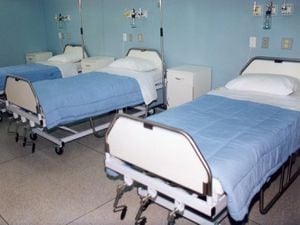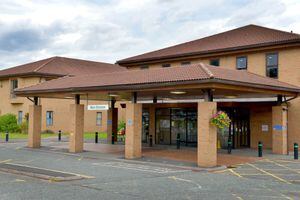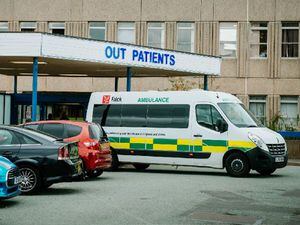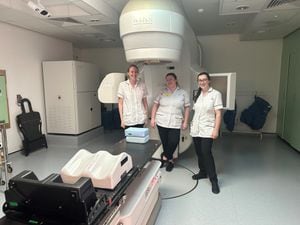Nearly 20 hospital beds a day blocked in Shropshire
Nearly 20 beds a day are occupied by patients who no longer need to be in hospital in Shropshire, new figures have revealed.

In a single month, a combined 582 days were spent by patients across the county waiting to be discharged or transferred to a different care facility.
The Care Quality Commission says there is “too much ineffective coordination” of health and social care services in England.
Delays can be caused by problems within the NHS, like waiting for a bed to open up in a rehabilitation centre or mental health hospital, or problems with social care, such as delays in setting up community care.

Figures from NHS England, which are for August, showed patients at Telford’s Princess Royal Hospital and Royal Shrewsbury Hospital spent 243 days waiting to be discharged or transferred – equivalent to eight months.
At Robert Jones and Agnes Hunt Orthopaedic Hospital NHS Foundation Trust, which runs the orthopaedic hospital in Gobowen, a total of 203 days were spent by patients waiting, during the same month.
Meanwhile, patients at Shropshire Community Health NHS Trust, which runs community hospitals across the county, spent a total of 136 days waiting to be discharged or transferred.
Health trusts say they are working with care providers and commissioners to reduce the number of delays.

A delayed transfer of care occurs when a patient remains in a bed after being officially declared safe for transfer by both a doctor and a multidisciplinary team, which could include social or mental health care workers.
Delays in transferring a patient between wards, or from one acute hospital to another, were not included.
Kate Terroni, chief inspector of adult social care for the CQC, said: “We found positive outcomes for older people when leaders in local health and care organisations worked well together.
“But we also found too much poor practice where a lack of co-ordination and co-operation between services had led to fragmented care and badly affected people’s experiences."
An NHS England spokesman said nationally this year there have been 14,000 fewer bed days lost than last year.
Health bosses working to reduce 'bed blocking' in hospitals
Health bosses today said they were working closely with care providers and commissioners to reduce 'bed blocking' in the county's hospitals.
It comes after NHS England figures for August showed nearly 20 patients a day who are fit to be discharged are taking up beds.
With elderly patients often stuck waiting to be signed off, there is concern over the impact delays can have on their health.
According to the NHS, a hospital stay of more than 10 days for a person over 80 can lead to 10 years of muscle ageing.

The figures show the number of beds blocked at Shrewsbury And Telford Hospital NHS Trust and Shropshire Community Health NHS Trust (Shropcom) had fallen compared to August 2018, but there was a slight rise at Robert Jones And Agnes Hunt Orthopaedic Hospital NHS Foundation Trust (RJAH).
Delays can be caused by problems within the NHS or issues with social care.
Nicki Bellinger, interim director of nursing at RJAH, said: “We are working with care providers and commissioners to reduce the number of delayed transfers of care, to improve the overall care of our patients. In these instances, a large proportion of these patients are from outside the county.
“The aim is ultimately to be able to discharge our patients as soon as they are medically fit, while ensuring that they have the right rehabilitation and care package in their home setting.”

Steve Gregory, director of nursing at Shropcom, said it is important that patients are cared for in the most appropriate setting for their needs.
He said the figures related to a small handful of patients with complex needs that must be met so that they can be discharged or transferred safely.
"Sometimes it takes longer than we would like to enable the right support or service to be available," he added.
“We work with others within the Shropshire care system to make sure any delay is kept to a minimum and, where possible, we look for learning or system changes that would help in similar situations in future.”
Telford & Wrekin Council said it works closely with NHS partners and there is a team dedicated to forward planning, supporting and arranging discharges from hospital for those people who have complex needs.
Support
Council spokesman Russell Griffin said: "Additional social care staff and community care capacity has been commissioned to support individuals at home or into the most suitable bed-based care setting to help enable individuals to return home and maintain their independence.
"Through the work of hospital based team there has been a reduction in the time taken to discharge individuals from when they have been identified as ready to leave the acute hospitals setting.
"The latest delayed transfers of care performance shows Telford and Wrekin adult social care was 14th nationally. Telford and Wrekin is currently forecast to achieve its nationally set target for delayed transfers of care."
Shropshire Council says its adult social care services and NHS partners in Shropshire have seen a sustained long-term improvement in the reduction of delays.
Delays in discharging patients from RSH and PRH, relating to Shropshire Council's adult social care services, accounted for three days in August.
The council's adult social care is ranked 7th nationally and joint first in the West Midlands.

Shropshire’s integrated community services team, jointly run by Shropshire Council adult social care services and Shropcom, provides short-term support for patients who are ready to leave hospital.
It also works closely with other organisations to identify people who need support to avoid an admission to hospital in the first place.
Tanya Miles, Shropshire Council’s assistant director for adult social care, added: “Our social care teams work extremely hard to support people to be discharged from hospital as soon as they are well, and help people avoid hospital admissions.
"We are seeing their hard work being paid off by the month by month reduction in delayed discharges of care figures attributed to adult social care.
“We continue work with our health and social care partners to further explore possible solutions to help reduce the number of patients remaining in hospital and returning home, which we know they prefer to be.
“I would like to say a huge thanks to all those involved who I know have worked extremely hard to ensure that people return home from hospital as soon as possible. This is a great result from the team.”
Across England, an average of 4,802 beds were blocked each day in August 2019, resulting in a total of 148,872 delayed days – equivalent to just under 408 years of lost time.
Kate Terroni, chief inspector of adult social care for the CQC, said when people can’t access the services they need, the risk is that "they are pushed into inappropriate care settings and stay there for too long rather than accessing the care they need within their community".





